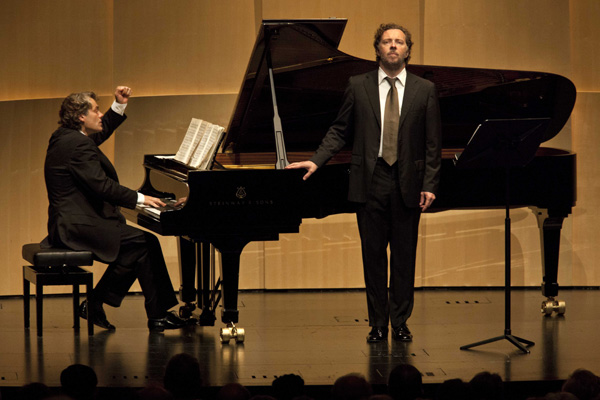 Austria F.Schubert: Gerold Huber (piano), Christian Gerhaher (baritone), Haus für Mozart, Salzburg, 10.8.2012 (JFL)
Austria F.Schubert: Gerold Huber (piano), Christian Gerhaher (baritone), Haus für Mozart, Salzburg, 10.8.2012 (JFL)
Schubert: Die schöne Müllerin, op. 25, D. 795
Liederabend • Christian Gerhaher
  A.Schoenberg et al., The Book of the Hanging Gardens, C.Gerhaher / G.Huber Sony       F.Schubert, Die Schöne Müllerin, C.Gerhaher / G.Huber Arte Nova     |
At 11.35am on Friday, August 10th, Christian Gerhaher stepped out on stage of the Haus für Mozart for his Schubert Liederabend—really a Liedermorgen. He sported his characteristic crabby-grumpy look that makes him appear crumpled even when the impeccable suit is freshly pressed. From beneath the look of discomfort he pressed out a tight, brief hint of a smile, positioned himself (right hand on the front corner of the Steinway’s nook and the soles of his shoes on one spot, so immovably, they might as well have been bolted in place), and began with Schubert’s Schöne Müllerin. On this occasion enriched by the three poems (but not the gregarious prologue and epilogue) of Wilhelm Müller’s cycle that Schubert did not set to music.
Unlike Pavol Breslik, who performed the Müllerin last month at the Oleg Kagan Musikfest, and for whom no fourth wall exists, Gerhaher is a specimen of singer to be observed, as if exhibited on stage, with a distance that belies the directness with which he communicates. That his way of singing is incomparably artless doesn’t mean there’s a sense of relaxation about him, nor the distance he creates that there is a didactic vein in his delivery. There is an impersonable aloofness about him, but he can touch more profoundly than the chummiest artist.
That said, the opening “Das Wandern” was quite conventional, quality Lied-singing. In “Wohin” the first glimpse of that understated, ‘normal’ touch he imparts on the text: So brief, on the line “Ist das denn meine Straße?”, that it would have been easy to miss, yet worth attending the recital for. That is more or less how it went, increasingly more moving until the first recited poem, “Das Mühlenleben”. It may just be the unfamiliarity with these three poems that made especially this first strike such a different tone: far more descriptive; a summary of the protagonist’s life, an interlude, but not propelling the drama. But the intrusion was offset by Gerhaher’s comfortable, lively recital, without false minimalization or achingly picturesque characterization, and a healthy soupçon of humor.
A truly impatient “Ungeduld” followed, and after that “Morgengruß”, and with it Gerold Huber and his singer began an irreversible descend into the darkness where Gerhaher is most comfortable—he, and Erebus. The last two lines “And from the depth of the heart / love draws grief and care” set the solemn, pain-enhancing tone, slowly, deliberately, and delicately played and sung. A short recovery in “Des Müllers Blumen” felt like the breath you take on a clear early fall day, which, despite your troubles, suggests a lung full of optimism with which to set out. Even if it should be in vain. By now the two Bavarians had the hall—inexplicably far from sold out—in tense silence. Even the song-intermittent coughing spells subsided.
Huber and Gerhaher only drove on; came to the second recited poem, “Erster Schmerz, letzter Scherz” (“First pain, last jest” – You can find the text and translation of all three poems not set to music below). It’s one of the most personal of the poems, and marks the transition to bitterness. A grim joke in the penultimate stanza had the audience chuckle, the last stanza immediately deflate them. And then Gerold Huber’s profoundly moving introduction to “Die liebe Farbe” dug its nails into the listener’s soul, perfectly matched to the preceding poem. It epitomized how Huber paints pictures in duet with Gerhaher… how he disappears like the best “accompanists”, but how he is as responsible for the impression that lingers, how he is an inseparable master in a team with Gerhaher. And while similar things have been said about great accompanists of the past (that’s really: regular accompanists of great singers), back then it seemed to suffice that it wasn’t an insensitive hack sight-reading along to elicit such praise. Now Huber and the best of his colleagues—Christoph Berner and Mitsuko Uchida come to mind—have raised the bar immensely.
The two artists further tightened the oppressive screws, grave and graver, without ever calculating or caring about the impression they would leave on the audience… all stemming from an inner sincerity and conviction. Something started to take a hold, at least of me, and Huber-Gerhaher merely channeled it. A mood like a dark mist came down on the audience and grasped with its thin fingers coldly into hearts, squeezing gently, slowly, ever tighter, until the listener, I, surrendered.
What started as entertainment became artful masochism, a dramatic experience, uncomfortably exposing all the vulnerabilities already within oneself. When it was finally over, the applause—sustained, enthusiastic, and accompanied by roaring “Bravi”—contained relief and gratitude. I left, shaken, reminded of what music, at its best, can do to a poor listener.
Jens F. Laurson

